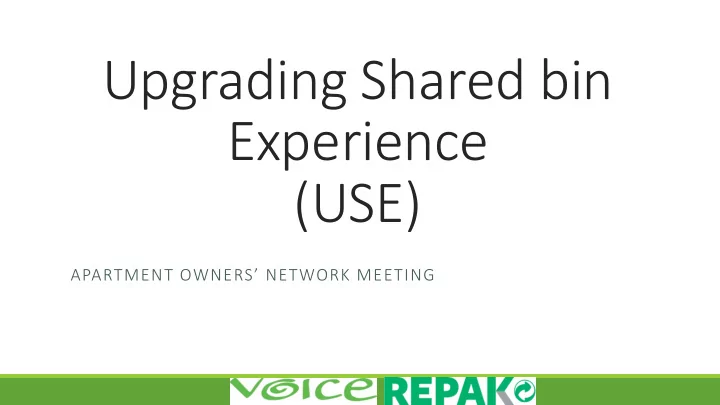

Upgrading Shared bin Experience (USE) APARTMENT OWNERS’ NETWORK MEETING
VOICE – working for a more sustainable future
Aims of USE A project run by VOICE with funding and support from REPAK A national pilot project focusing on the unique challenges of shared bin usage Working with all stakeholders : ◦ Residents, management, waste contractors To improve Recycling rates of shared bins through: ◦ Engagement with all stakeholders ◦ Education ◦ Information sharing ◦ Interventions to improve ease of recycling
Why Segregate Waste…It’s the law! 9. Provisions affecting Multi-user Buildings, Apartment Blocks, etc. (DLR Waste Bylaws) A management company, or an other person if there is no such company, who exercises control and supervision of residential and/or commercial activities in multi-unit developments, mixed-use developments, flats or apartment blocks, combined living/working spaces or other similar complexes shall ensure that: (a) separate receptacles of adequate size and number are provided for the proper segregation, storage and collection of recyclable kerbside waste, residual kerbside waste and food waste, (b) the receptacles referred to in paragraph (a) are located both within any individual apartment and at the place where waste is stored prior to its collection, (c) any place where waste is to be stored prior to collection is secure, accessible at all times by tenants and other occupiers and is not accessible by any other person other than an authorised waste collector, (d) written information is provided to each tenant or other occupier about the arrangements for waste separation, segregation, storage and presentation prior to collection,
Site selection
Information Gathering 1. Waste Characterisation studies 2. Survey of residents Mixed Solid Waste contents other recycling 21% Recyclable 32% Not recyclable 47% Mixed Dry Recyclables other recycling 22% Recyclable 42% Not recyclable 36%
Information Dissemination Bin Area and common area signage
Engagement and education
Outputs Each site ◦ Waste characterisation study ◦ Survey on attitudes and behaviours towards recycling ◦ Workshop on recycling ◦ Recycling bag Project wide ◦ Focus groups on recycling in shared bin facilities End of project ◦ Report outlining suggestions and findings from the project
Recommend
More recommend